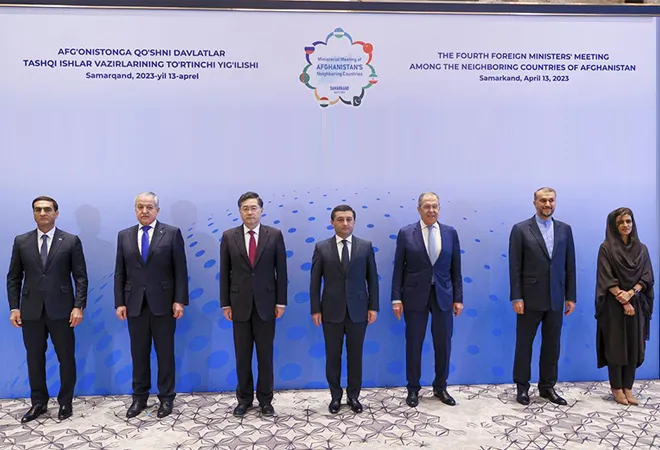In early April this year (12-13), the Foreign Minister of the People’s Republic of China (PRC) Qin Gang, along with his counterparts from Russia, Iran, Pakistan, Tajikistan, Turkmenistan and Uzbekistan met in Samarkand for < style="color: #000000">the meeting of the Foreign Ministers of Afghanistan’s neighbouring countries. The meeting coincided with the release of a position paper by Beijing on its policy in Afghanistan. Titled, ‘China’s position on the Afghan Issue’, the 11-point paper is important for two reasons, the first vis-à-vis China’s involvement in Afghanistan, giving a clear indication of Beijing’s policy towards the crisis-ridden country and the areas it will prioritise in its engagement with the Taliban moving forward. Beyond Afghanistan, the paper is reflective of China’s recent efforts to refashion how it is viewed internationally — from a country bent on disrupting the current world order to one which is heavily invested in addressing ‘international hot button issues’ objectively with no motivations to further its vested interests, unlike America.
The context of the policy choices
Contextualising its policy towards Afghanistan, the paper first delineates the core principles which inform Beijing’s policy choices — the ‘Three Respects’ and ‘Three Nevers’, i.e., China respects the independence, sovereignty and territorial integrity of Afghanistan and the ‘independent choice’, religious sentiments and national customs of the Afghan people. These principles are put in opposition to the policies followed by the West which, according to Beijing, are informed more by geopolitics and their vested interests.
Deriding the U.S. for imposing unilateral sanctions and illegally freezing Afghanistan’s foreign reserves, China calls for a reversal of these actions.
As per China, Afghanistan is currently transitioning from a period of turbulence under a United States-backed government to relative stability under the Taliban. A consistent trope throughout the paper is the West’s failure in fulfilling its commitments to the country. Its decision to intervene militarily and enforce its conception of democracy without taking into account the distinct characteristics of Afghanistan is blamed for starting the crisis in the first place. Deriding the U.S. for imposing unilateral sanctions and illegally freezing Afghanistan’s foreign reserves, China calls for a reversal of these actions. In response to Washington’s failure to introspect, Beijing makes a case for its suitability as a better-placed and more responsible actor, capable of adopting and implementing an alternative, regional approach towards Kabul. It commits itself to invest in the country’s reconstruction and development and help it move towards a more sustainable form of economy.
Using groupings without the U.S., its allies
Urging the international community to view the Afghan issue in a ‘comprehensive, balanced and objective manner’, China advocates using alternative regional groupings which do not include the U.S. and its allies, such as the Shanghai Cooperation Organisation (SCO), the Moscow Format Dialogue, the Foreign Ministers’ group which just met, the China-Afghanistan-Pakistan Trilateral Foreign Ministers’ Dialogue, etc. for discussing the Afghan issue. This will help Beijing in promoting an alternative model as opposed to the battered approach of the West, allowing it to focus more on its priorities and form a consensus among Afghanistan’s neighbours. A distinct regional approach precluding any U.S. involvement will also strengthen its leadership and peace-making credentials while giving it the space to raise its credo against the activities of the U.S.
Framing its involvement in purely humanitarian terms, good neighbourliness and mutual respect for its neighbours, Beijing has avoided acknowledging its own interests in the country. It blames the current turmoil in the world, with the presence of multiple crises and renewed competition, for forcing it to adopt a ‘proactive approach’, arguing how countries are urging China to take charge as the U.S. has abdicated its responsibility. This characterisation of its actions is done to mask how stability in Afghanistan is also important for Beijing to attain its own security and economic interests in the country and to present a counter to U.S. hegemony, both politically and financially.
Why Afghanistan is important
For China, the threat of terrorism emanating from Afghanistan and its potential to harm Chinese interests and personnel, both in the wider region and within China’s western border, are very real. Calling for a bilateral and multilateral approach to respond to the ‘Three Forces’ of terrorism, extremism and separatism, China urges the Taliban, regional countries and the international community to crack down on terror groups, specifically the East Turkestan Islamic Movement and help Afghanistan in augmenting its counterterrorism capabilities. The question of refugees and the production and sale of narcotics and their cross-border trafficking are also highlighted in the paper, demonstrating their importance for Beijing. Owing to its strategic location, Afghanistan is also economically very important for China: for its Belt and Road Initiative (BRI) and due to the presence of vast untapped mineral resources inside the country. While economic engagement between the two sides has continued, Chinese companies have shown an interest in investing in lithium deposits and other mines and oil fields. These economic imperatives also necessitate its involvement.
Framing its involvement in purely humanitarian terms, good neighbourliness and mutual respect for its neighbours, Beijing has avoided acknowledging its own interests in the country.
Since the beginning of 2023, China has taken incremental steps to entrench its image as a major country playing a crucial role in ensuring global governance and providing a ‘moderate and pluralistic environment’ for dialogue. The release of the concept paper on the Global security initiative and the peace proposal on Ukraine which preceded the position paper on Afghanistan signal Beijing’s quest to modify its image and solidify its role as a responsible mediator. Its apparent success in bringing Iran and Saudi Arabia to the negotiating table and the visits by leaders from Europe is projected as an indicator of Beijing’s growing influence.
While the Taliban have welcomed the paper and China’s ‘long-term political support’ to the country, China’s success in Afghanistan will remain contingent on what it could offer to the Taliban. China’s high-sounding rhetoric on the linkages between Afghanistan and China has failed to materialise into an increased footprint on the ground. For India, China’s continued engagement with Russia and Iran, along with the Central Asian countries will be consequential in understanding how their policies will shape and what it would mean for India’s interests in Afghanistan.
This commentary originally appeared in The Hindu.
The views expressed above belong to the author(s). ORF research and analyses now available on Telegram! Click here to access our curated content — blogs, longforms and interviews.


